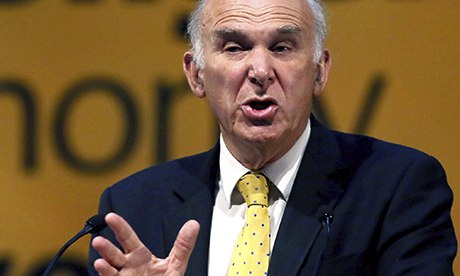As someone who has worked a zero-hours contract, I welcome Vince Cable's consultation – and his intention to crack down on exploitation

Vince Cable intends to crack down on 'exclusivity clauses [in zero-hours contracts], meaning their workers are guaranteed no hours, but are prohibited from finding work with anyone else'. Photograph: David Cheskin/PA
Vince Cable today launched a consultation on zero-hours contracts, saying he wanted greater fairness, but would not be calling for a complete ban. Having worked a zero-hours contract for just under a year, I think he's right. For many, a flexible contract where you are not obliged to work fits in well with the demands of studying or another job. The problem is not with the contracts themselves, but with the way that employers are abusing them.
It is estimated that about 1 million Britons are on these contracts, and in recent years they have become much more widespread. For those who have a steady source of income that covers rent, food and other essentials, but occasionally need to top it up with extra work (such as students in the summer holidays, or those who have retired), zero-hours contracts can be a good fit for both employer and employee.
The problems arise when companies use zero-hours contracts for nearly all their staff, as a way to cut their own costs and limit the rights that their workers have. The distinction between "worker" and "employee" is a complicated one, but those on zero-hours contracts are usually defined as workers, meaning they have fewer rights than employees. Employees are entitled to statutory redundancy pay and the right not to be unfairly dismissed. Not all workers, however, are.
If you want a job with guaranteed hours, to be forced on to a zero-hours contract denies you the psychological security that comes with knowing how much you will earn in a given month. Insecure employment means that you are constantly worrying about money and making ends meet: you can have plenty of hours one week, and none the next. There is no safety net of a minimum number of hours. There is nothing to stop you from earning nothing.
And some companies have even been using exclusivity clauses, meaning their workers are guaranteed no hours, but are prohibited from finding work with anyone else. Vince Cable has announced that he intends to crack down on these, but it is an indication of how exploitative the current labour market is that they have so far been allowed.
Zero-hours contracts enable companies to transfer the burden of an uncertain economy on to those that they employ. They are assured of a pool of workers from whom they can draw in busy times and ignore in quieter times. At the staffing agency I worked for, we were told that some shifts were "non-cancellation", meaning that cancelling the shift (even from ill health or an emergency) would incur a fine of £10. Yet the company was not restrained by its own rules: once I took a day off my internship to make a non-cancellation shift, as I needed the hours. The day before, I was told numbers had been reduced so I would no longer be needed after all. This short-term cutting of shifts happened often, sometimes just hours before you were meant to start.
A culture in which employers are allowed to treat their workers as disposable cogs in a commercial machine is exploitative, and there needs to be more regulation to ensure that those who want a stable, set-hours contract are entitled to one, while those who need to work flexibly can continue to do so. The needs of businesses should not take precedence over the rights of those that work for them – even in an economic situation that seems to have lapped up most of our principles with it.

No comments:
Post a Comment